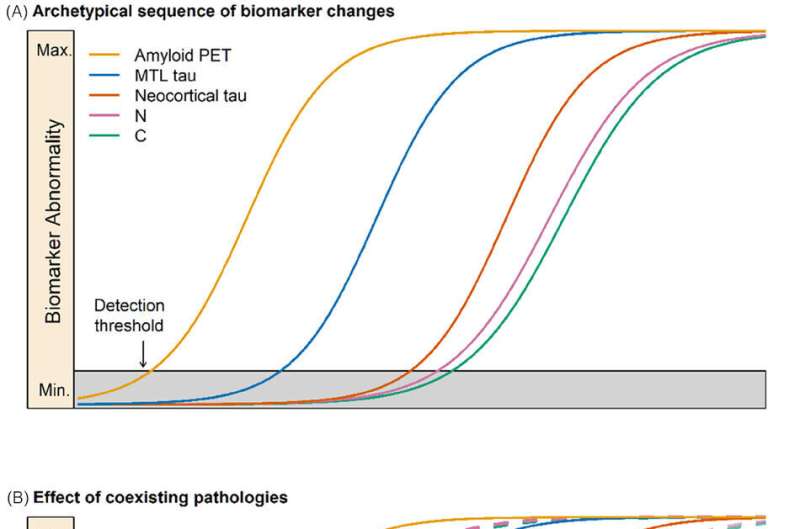This article has been reviewed according to Science X's editorial process and policies. Editors have highlighted the following attributes while ensuring the content's credibility:
fact-checked
peer-reviewed publication
trusted source
proofread
Biology-based criteria for diagnosis, staging of Alzheimer's disease

The Alzheimer's Association has published revised criteria for the diagnosis and staging of Alzheimer's disease that are based on the biology of the disease and reflect recent advancements in research, diagnostics and treatment.
"Defining diseases biologically, rather than based on symptoms, has long been standard in many areas of medicine—including cancer, heart disease and diabetes—and is becoming a unifying concept common to all neurodegenerative diseases," says Clifford Jack Jr., M.D., a Mayo Clinic neuroradiologist, part of a workgroup convened by the Alzheimer's Association and lead author on the criteria published in Alzheimer's & Dementia.
"An unchanging principle is that effective treatment will always rely on the ability to diagnose and stage the biology driving the disease process."
The revised criteria define Alzheimer's disease as a biological process that happens in the brain before people exhibit symptoms of cognitive impairment, such as memory and thinking problems. However, the workgroup does not recommend diagnostic testing in cognitively unimpaired people who are not in research studies. No treatments have been approved for cognitively unimpaired people.
Updating the criteria was prompted by approval of the first disease-modifying treatments for Alzheimer's and emerging Alzheimer's blood tests. "These updates to the diagnostic criteria are needed now because we know more about the underlying biology of Alzheimer's, and we are able to measure those (brain) changes," Dr. Jack says.
Treatments that target the toxic amyloid protein that builds up in the brain have been approved for patients with mild Alzheimer's disease who meet specific criteria. To be eligible for treatment, biomarker proof—from blood, cerebrospinal fluid and brain images—is needed, showing that the underlying biology is present in a person's brain.
"Clinical use of (Alzheimer's) biomarkers is presently intended for the evaluation of symptomatic individuals, not cognitively unimpaired individuals," the authors note.
"At the present time, disease-targeted therapies have not been approved for cognitively unimpaired individuals with (Alzheimer's). For this reason, we currently recommend against diagnostic testing in cognitively unimpaired individuals (outside of research studies)."
More information: Clifford R. Jack et al, Revised criteria for diagnosis and staging of Alzheimer's disease: Alzheimer's Association Workgroup, Alzheimer's & Dementia (2024). DOI: 10.1002/alz.13859




















